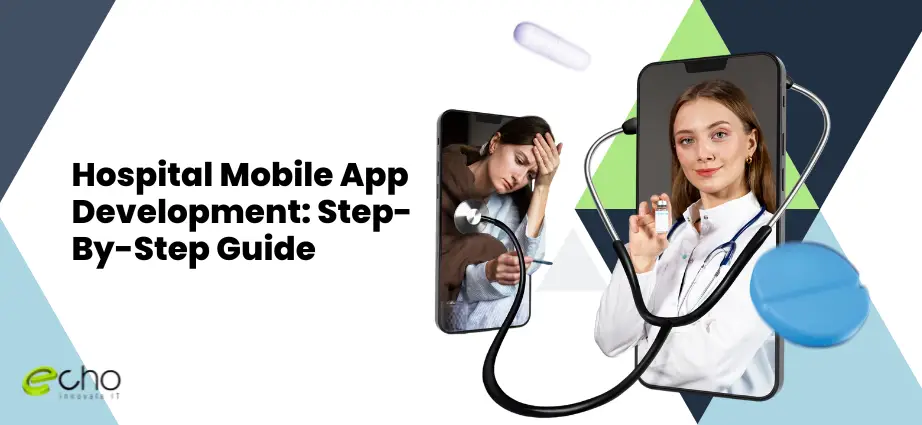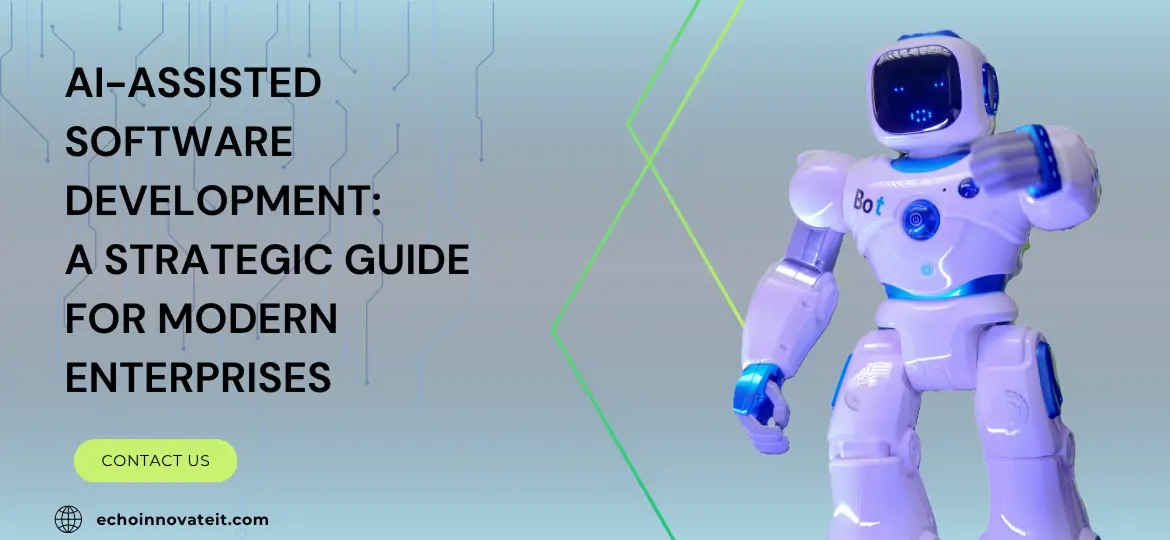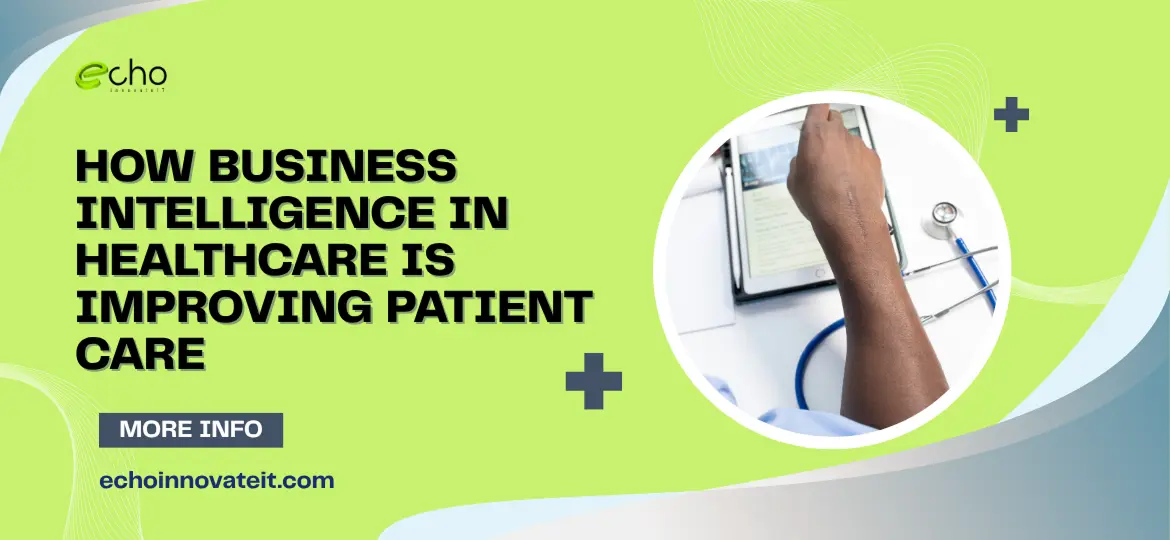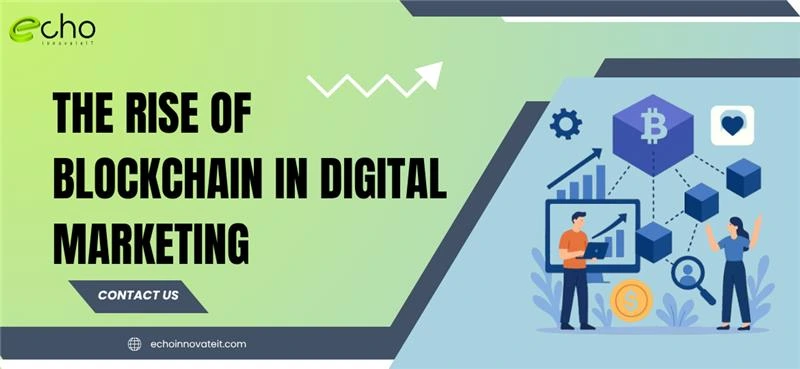Why should you invest in Hospital Mobile App Development?
Have you ever heard about popular applications like Doximity and Medscape? These healthcare apps provide easy access to Physicians and healthcare professionals. They also come with cool features like medical calculators, and pill identifiers, providing the latest drug and medical-related research. With this growing significance of mobile applications in the healthcare market is increasing.
Hospital mobile apps serve patients, doctors, hospitals, and pharmacies by providing medical supply delivery, online consultation, diagnostics, appointment scheduling, and other services. Patients can receive medical care remotely through mobile app development services. Speaking of the market size, the global Health applications market is predicted to increase from $80.87 billion in 2023 to $861.40 billion by 2030, with more than 350,000 medical applications available in app stores worldwide. All these factors make hospital mobile app development a lucrative deal.
Let’s understand more about it in detail…
Why Should You Consider Hospital Mobile App Development
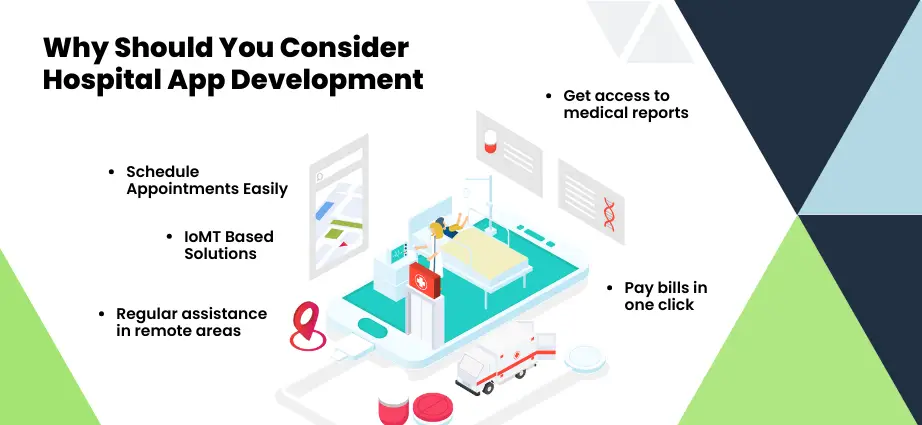
Here are some of the benefits of developing a healthcare application:
Schedule Appointments Easily
Multiple trips or phone calls to the hospital or receptionist to inquire about a doctor’s availability and book an appointment can be inconvenient for both patients and staff. However, hospital communication applications can help by allowing users to verify a doctor’s availability, arrange appointments quickly, and set reminders. This makes the booking procedure easier for patients and lowers the effort of receptionists who would otherwise have to make reminder calls.
Get Access To Medical Reports
Patients no longer have to visit hospitals and laboratories to receive their medical reports. Patients can now view their reports online at any time and from any location, without fear of forgetting or misplacing them.
This novel method provides patients with enhanced convenience while also reducing paperwork stress. Hospital management no longer has to worry about physically collecting, storing, and delivering reports. Instead, they can tap their tablet to send the report immediately to the patient.
Pay Bills In One Click
Managing hospital bills is a difficult undertaking for both hospital employees and patients. It takes time to keep track of payments and follow up with insurance companies for clearance. Patients can use medical applications to select their preferred payment option, pay bills online, and interact with their insurer when needed, reducing the entire process to a matter of minutes.
Also Read:
IoMT Based Solutions
IoMT (also known as the Internet of Medical Things) supplies the equipment and networks required for telemedicine and virtual treatment. Remote healthcare skills gained popularity during the peak of the COVID-19 epidemic as a way to reduce the number of people traveling to healthcare institutions and relieve the load on overburdened hospitals and other medical facilities.
Regular Assistance In Remote Areas
Mobile health apps have several advantages, especially for individuals who live in suburbs or distant places. These apps enable people to get high-quality healthcare treatments without having to physically travel to a hospital.
Remote patients can receive prompt care and medical attention by organizing video conversations with doctors. This means that patients can forgo regular clinic appointments because doctors can remotely monitor their health via smartphone apps.
Features To Add In Your Hospital Mobile App
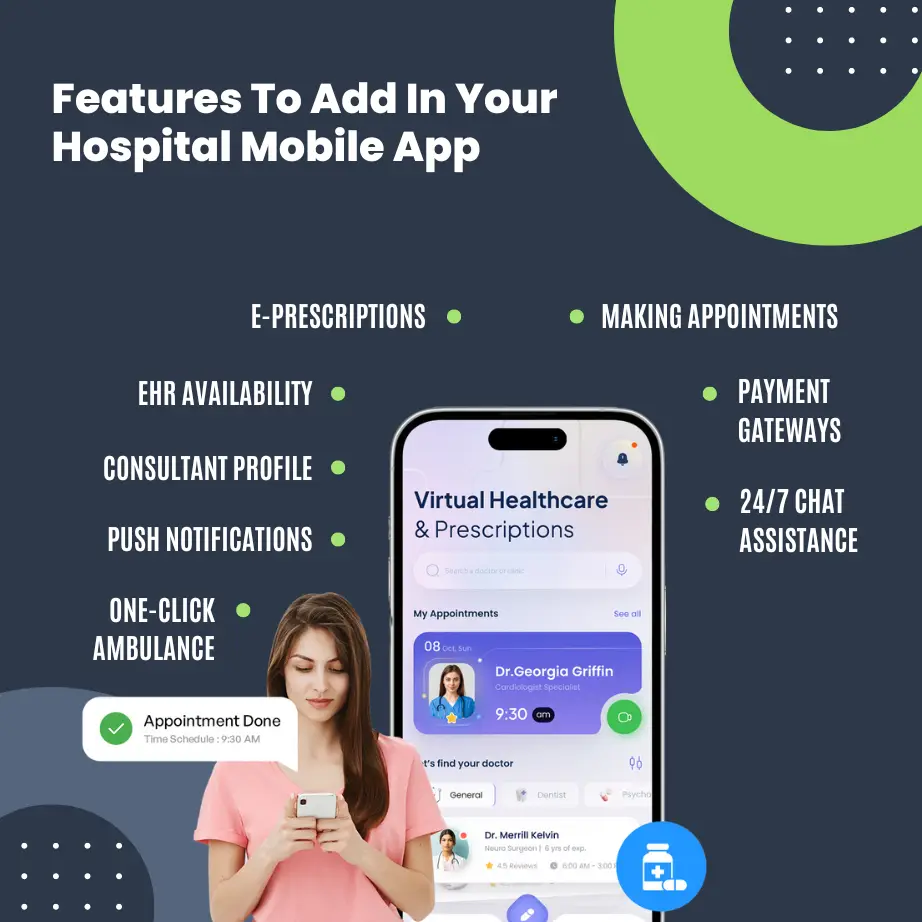
E-prescriptions
Doctors can use an e-prescription feature to generate and distribute prescriptions without error. This saves time, improves communication, and increases patient happiness. This also allows clinicians to view prescription insurance formulary information, which includes all information from electronically connected pharmacies.
EHR availability
Appointment management and video conferencing services are used to schedule appointments, but what happens after that? The doctor issues a diagnosis and changes the patient’s medical record in the hospital’s internal system. This is why your healthcare app should have an EHR capability.
With this functionality, doctors can fill out the health form in a separate interface within the app and then combine the data into the internal system. The emergence of mobile health apps allows physicians to monitor their patients’ behavior between appointments and change it based on demand.
Making appointments
Many outstanding hospital mobile apps contain a function known as appointment management. As the name implies, this function allows you to easily schedule doctor’s appointments or video consultations.
An efficient appointment management tool should show patients when they can see their doctors. Doctors should be able to access their calendars, monitor forthcoming appointments, accept or decline them, and adjust their availability as needed.
Payment gateways
A healthcare app, like any other modern mobile application, should include payment integration. If you provide paid medical services, such as paid consultations, you will want your customers to have an easy and quick way to pay for their appointments.
Consider incorporating payment gateways such as Paypal, Adyen, Visa, and Mastercard credit card payments into your app. This makes it easy for patients to pay invoices and doctors to collect payments.
Push notifications
Healthcare drugs should also make full use of notifications to their users. Push notifications can be as tailored as possible; for example, they might be used to remind patients to take their medications or to schedule an appointment with their doctor. A medical app could help clinicians remember to check in with their patients or schedule appointments.
24/7 chat assistance
The ability to speak with a doctor via an app will speed up services and contribute to the establishment of trusted connections between patients and healthcare providers. It can be modified through video conferencing allowing patients to enjoy an in-hospital experience and visit their doctor’s office without leaving their homes.
Also Read:
Consultant profile
Finding an appropriate physician is a vital step in the patient’s journey. Selecting any item from the list is not a valid option. The doctor’s profile saves time for both patients and doctors. This also increases the accuracy of the doctor-patient matching process.
One-click ambulance
This function is critical for addressing emergency issues in unexpected scenarios. A one-click ambulance call can be really helpful in this situation. This function allows you to request emergency assistance for yourself, friends, or family.
This feature tells trusted contacts and the hospital of the specific position.
Additionally, you can identify nearby laboratories and pharmacies to seek assistance in the event of an emergency.
Step-by-Step Guide To Hospital Mobile App Development
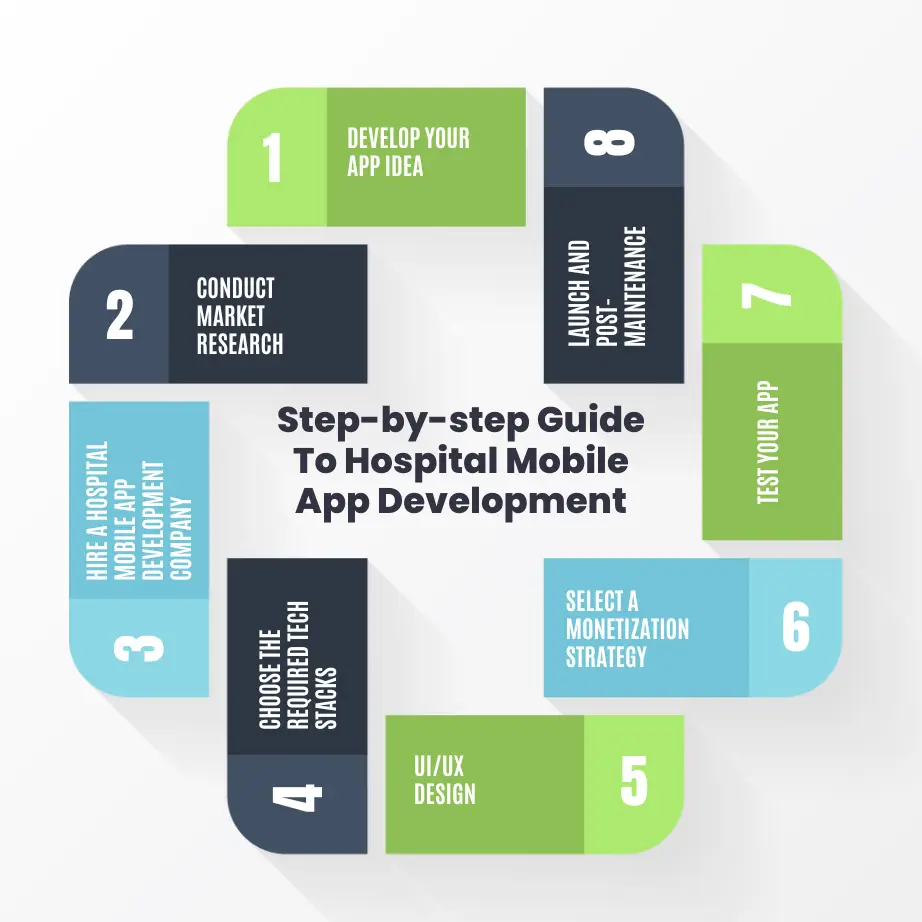
Develop Your App Idea
Are you interested in creating mobile healthcare applications for patients or medical professionals? Custom healthcare software development is more likely to succeed when it is designed with the user in mind. Once this distinction has been established, it is time to properly connect with the end user to understand their needs and goals via the hospital mobile application.
When choosing the hospital mobile app development services, you must precisely define the problem to be solved or the gap to be filled. There are various possibilities for healthcare application development, and you must be certain of what you want. Your target audience, competition, prices, and so on are all factors to consider while creating a healthcare application.
Hire A Hospital Mobile App Development Company
Hiring a hospital mobile app development company is the most critical stage, as only a reputable company can guarantee the success of healthcare applications. A premium app development partner will co-innovate with clients and provide them with a concept of how to design and construct an app with trending functionalities and features at the lowest prices.
The professionals will approach the project with great accuracy, and the development capabilities will ensure that the product is disruptor-ready to stay ahead in the digital era.
Also Read:
Choose The Required Tech Stacks
The technology stack used for hospital mobile app development is determined by a variety of criteria, including the type of application, functionality, scalability, security, and interoperability needs. However, here are some of the most widely used technologies and frameworks for healthcare mobile app development:
- Front-end: HTML, CSS, JavaScript
- Back-end: Java, Python, Node.js
- Frameworks: Spring, Flask, Django
- Operating System: iOS, Android, Cross-Platform
- Database: MySQL, Oracle
- Cloud Storage: AWS, Microsoft Azure
- iOS: Swift
- Android: Java
- Security: HIPAA (Health Insurance Portability and Accountability Act) for the United States
UI/UX Design
Healthcare applications have a specific target persona who prefers outcomes from a simple application. Choose the UX/UI functionality that best suits their needs. For example, older folks prefer easy navigation with mild colors, but younger viewers may choose a bright UI with distinctive functionalities.
Thus, the application’s design will be determined by the preferences of the target audience. An experienced healthcare app development business typically employs a team of UX/UI professionals to advise you through the design process, resulting in a more visually appealing application.
Test Your App
Hospital apps frequently need to combine custom solutions with established healthcare systems. This integration and testing procedure guarantees that data flows smoothly between the new app and these platforms. Rigorous testing is carried out to guarantee that the app satisfies high requirements, including functional, security, and performance tests. Healthcare practitioners can be confident in the app’s dependability and effectiveness after thoroughly testing it.
Launch And Post-Maintenance
Users can access the app after it has been deployed in a production environment. The deployment process may include the setup of servers, databases, and cloud hosting services. The application’s performance and availability are constantly monitored.
The creation of hospital applications is an ongoing effort. To keep the app up-to-date and reliable for users, developers deliver updates, security fixes, and maintenance regularly.
Cost of Hospital Mobile App Development
The average cost of developing a hospital mobile application is around $450,000. Although it depends on various factors. The cost of developing a healthcare application increases as the concept becomes more complex. Custom UI components, the number of screens and application states, buttons, fields, business logic, and server infrastructure all demand a significant amount of development and testing time.
Thus the total cost is dependent on the following factors:
- Pre-development stage
- Total number of platforms
- Integration of healthcare trends (Like AI, Blockchain, IoT, etc.)
- Complexity of app
- Company’s cost and policies
- Marketing and licensing
Conclusion
Developing a healthcare app is critical for both medical business owners and patients. It provides everything necessary, including time savings, prompt medical care, precise diagnosis, secure financial transactions, and much more. Today, a single medical app can handle several tasks and duties.
It can be available 24/7 for patients, there is a quick and easy process to make appointments and payments, and it works well in remote areas too. As a result, we are seeing a significant increase in the development of healthcare mobile apps. A powerful healthcare app can track a patient’s health, provide appropriate nutrition, and facilitate communication between healthcare practitioners and patients.
How Can Echoinnovate IT Make Your Hospital Mobile App Development Process Easy?
Do you have a hospital mobile app idea? Have you thought about starting a healthcare and medical solution for a long time? Are there any IT-related questions for which you are seeking relevant answers? Contact Echoinnovate IT, a renowned Hospital or Healthcare App Development Company providing custom app solutions for more than 13 years.
Learn more about the process of developing mHealth Applications and building creative applications to skyrocket your business!
Contact Us Now.
FAQs- Hospital Mobile App Development
What is a hospital mobile app?
A hospital mobile app is a software application designed to provide various healthcare services, such as appointment scheduling, medical records access, medication reminders, and telemedicine consultations, on mobile devices.
What are the benefits of developing a hospital mobile app?
Hospital mobile apps offer benefits like improved patient engagement, enhanced access to healthcare services, streamlined communication between patients and healthcare providers, efficient appointment management, and better patient outcomes.
What features should a hospital mobile app include?
Essential features for a hospital mobile app include appointment scheduling, secure messaging, access to medical records, medication reminders, telemedicine consultations, health education resources, and emergency assistance.
What technologies are commonly used in hospital mobile app development?
Technologies commonly used in hospital mobile app development include cross-platform development frameworks like React Native or Flutter, cloud services for data storage and processing, secure authentication methods such as OAuth, and APIs for integrating with hospital information systems.
